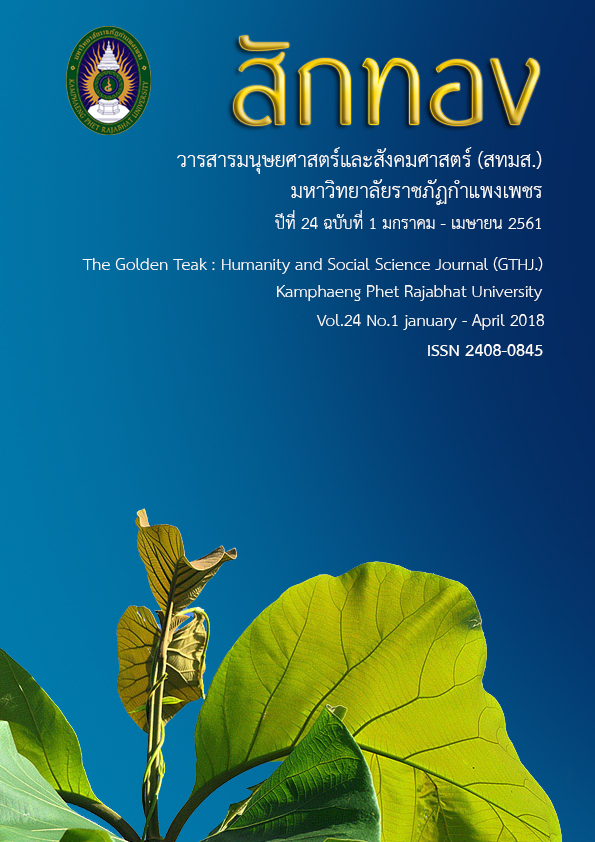Development of an instructional model of a self directed learning Laboratory for undergraduate students
Main Article Content
Abstract
This research had the objectives 1. To develop the instructional model of a self-directed learning laboratory for undergraduate students 2. To find its efficiency and 3. To survey the students’ satisfaction to the model. The sampling group was 29 undergraduate students of Power Electronics Division, King Mongkut’s University of Technology North Bangkok, with specific choice, and analyzed the data with Means, E1/E2 values, and Standard Deviation. The research result found that 1) The instructional model of a self-directed learning laboratory for undergraduate students consisted of 5 steps (1) Motivation (2) Planning (3) Constructional (4) Reflection (5) Evaluation, or the Instructional MPCRE Model. From the result of the suitability analysis of the MPCRE Model, 5 experts found that the model had the average suitability X = 4.34, S.D. =0.69, i.e. the suitability in the ‘Much’ level. 2) The result of the efficiency analysis of the model found that its efficiency had the values 72.71/71.71, which was lower than the specified criteria 85/85. 3) The satisfaction of the model was in the average level X = 4.15, S.D. =0.49. i.e. the satisfaction in the “Much’ level.
Article Details
บทความที่ได้รับการตีพิมพ์เป็นลิขสิทธิ์ของวารสาร สักทอง : วารสารมนุษยศาสตร์และสังคมศาสตร์ สถาบันวิจัยและพัฒนา มหาวิทยาลับราชภัฏกำแพงเพชร
ข้อคิดเห็นใดๆ ที่ปรากฎในวารสารเป็นวรรณกรรมของผู้เขียนโดยเฉพาะ ซึ่งมหาวิทยาลัยราชภัฏกำแพงเพชรและบรรณาธิการไม่จำเป็นต้องเห็นด้วย
References
Boonyasopon, T. (1983). Vocational and Technical Education for Industrial Development. Bangkok : King Mongkut's Institute of Technology North Bangkok.
Bryan, J.M. & Smith, J. C. (1975, November). A Self Paced Art History Learning Center at the University at South Carolina. Audiovisual Instruction, 20(9).
Chana, S., et al. (2013). Factors Affecting Learning Achievement in Electrical Measurement and instrumentation Major in Electrical Technology Songkhla
Rajaphat University. 28-29 November 2013 (pp.361-366). Bangkok : King Mongkut's of Technology North Bangkok University.
Chief Petty Officer First Class Manop Hangpai. (2013). A development of an instructional package on an intelligence by Using Case-Based Learning Approach Electrical Education. A Thesis in the Degree doctor of philosophy Department of teacher Training in Electrical Engineering Graduate School King Mongkut’s University of Technology North Bangkok.
Dixon, W.B. (1992). An Exploration Study of Self-directed Learning Ruddiness and Pedagogical Expectation about Learning among Adult Image Learners in Michigan. Doctoral Dissertation, Michigan State University, 1992. Dissertation Abstracts International. 55/07 (1995): 1789.
Hangpai, M. (2013). A Development of an Instructional Package on an Intelligence Control by Using Case-Based Learning Approach. Ph.D. thesis Graduate School King Mongkutys University of Technology North Bangkok
Khanom Mani, T. (2007). Teaching knowledge to effective learning process. (6 th ed.). Bangkok : Chulalongkorn University.
King Mongkut's of Technology North Bangkok University. (2012). Bachelor of Electronics Technology (Continued 2-3 years) 2012.
Kittiyanusan, R. (1999). The Self-Learning an encourage of Students Reflecting on the Research Process, Journal of Education and Social Development, 5(1-2), 146-147.
Kitroongrueng, P. (2010). The development of aninstructional model using case based Learning based on science of teaching to enhance student teachers’critical thinking. a Thesis submitted in Partial Fulfillment of the Requirements for the Degree doctor of philosophy Department of Curriculum and Instruction Graduate School silpakorn university.
Knowles, M.S. (1975). Self-directed Learning : A Guide for Learners and Teacher. Chicago : Association Press Follett.
Kongnonglan, J. & Thongpoon, C. (2015). Learning Achievement by Using a Seven-Step Inquiry Cycle (7E’s) In Chemistry Course, Entitled of Solution for the 11th Grade Students. The Golden Teak : Humanity and Social Science, 20(3) 124-137.
Richardson, V. (1994). Constructivist teaching : Theory and Practice. Teaching Thinking and Problem Solving, 16(1), 3-7.
Rogers, C. R. (1969). Freedom to learn. Columbus, Ohio : Charles E. Merrill Publishing Company.


